
Gilbert and Sullivan refers to the Victorian-era theatrical partnership of the dramatist W. S. Gilbert (1836–1911) and the composer Arthur Sullivan (1842–1900) and to the works they jointly created. The two men collaborated on fourteen comic operas between 1871 and 1896, of which H.M.S. Pinafore, The Pirates of Penzance and The Mikado are among the best known.
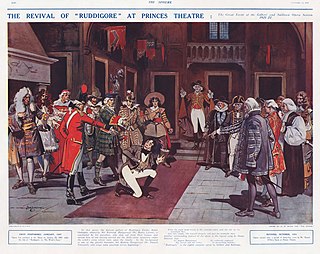
Ruddigore; or, The Witch's Curse, originally called Ruddygore, is a comic opera in two acts, with music by Arthur Sullivan and libretto by W. S. Gilbert. It is one of the Savoy Operas and the tenth of fourteen comic operas written together by Gilbert and Sullivan. It was first performed by the D'Oyly Carte Opera Company at the Savoy Theatre in London on 22 January 1887.

The Yeomen of the Guard; or, The Merryman and His Maid, is a Savoy Opera, with music by Arthur Sullivan and libretto by W. S. Gilbert. It premiered at the Savoy Theatre on 3 October 1888 and ran for 423 performances. This was the eleventh collaboration of fourteen between Gilbert and Sullivan.

Utopia, Limited; or, The Flowers of Progress, is a Savoy opera, with music by Arthur Sullivan and libretto by W. S. Gilbert. It was the second-to-last of Gilbert and Sullivan's fourteen collaborations, premiering on 7 October 1893 for a run of 245 performances. It did not achieve the success of most of their earlier productions.
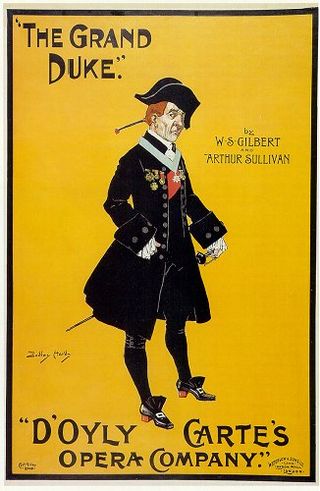
The Grand Duke; or, The Statutory Duel, is the final Savoy Opera written by librettist W. S. Gilbert and composer Arthur Sullivan, their fourteenth and last opera together. It premiered at the Savoy Theatre on 7 March 1896, and ran for 123 performances. Despite a successful opening night, the production had a relatively short run and was the partnership's only financial failure, and the two men never worked together again. In recent decades, the opera has been revived professionally, first in the US and then in the UK.
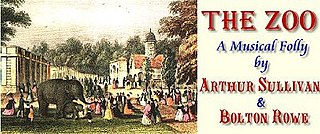
The Zoo is a one-act comic opera, with music by Arthur Sullivan and a libretto by B. C. Stephenson, writing under the pen name of Bolton Rowe. It premiered on 5 June 1875 at the St. James's Theatre in London, concluding its run five weeks later, on 10 July 1875, at the Haymarket Theatre. There were brief revivals in late 1875, and again in 1879, before the opera was shelved.

Charles Herbert Workman was a singer and actor best known as a successor to George Grossmith in the comic baritone roles in Gilbert and Sullivan operas. He was variously credited as Charles H. Workman, C. Herbert Workman and C. H. Workman.

Alice Barnett was an English singer and actress, best known for her performances in contralto roles of the Gilbert and Sullivan operas with the D'Oyly Carte Opera Company.

Edward Solomon was an English composer, conductor, orchestrator and pianist. He died at age 39 by which time he had written dozens of works produced for the stage, including several for the D'Oyly Carte Opera Company, including The Nautch Girl (1891). Early in his career, he was a frequent collaborator of Henry Pottinger Stephens. He had a bigamous marriage with Lillian Russell in the 1880s.

Basil Willett Charles Hood was a British dramatist and lyricist, perhaps best known for writing the libretti of half a dozen Savoy Operas and for his English adaptations of operettas, including The Merry Widow.
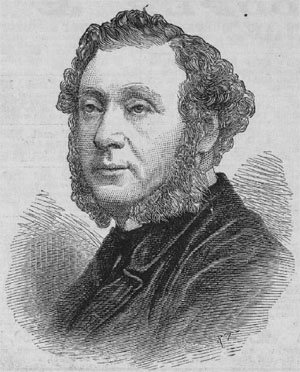
Thomas German Reed, known after 1844 as simply German Reed was an English composer, musical director, actor, singer and theatrical manager of the Victorian era. He was best known for creating the German Reed Entertainments, together with his actress wife, a genre of musical plays that made theatre-going respectable at a time when the stage was considered disreputable.

François Arsène Cellier, often called Frank, was an English conductor and composer. He is known for his tenure as musical director and conductor of the D'Oyly Carte Opera Company during the original runs and early revivals of the Savoy operas.

Ages Ago, sometimes stylised as Ages Ago! or Ages Ago!!, is a musical entertainment with a libretto by W. S. Gilbert and music by Frederic Clay that premiered on 22 November 1869 at the Royal Gallery of Illustration. It marked the beginning of a seven-year collaboration between Gilbert and Clay. The piece was a critical and popular success and was revived many times, including at St. George's Hall, London in 1870 and 1874, and in New York in 1880.
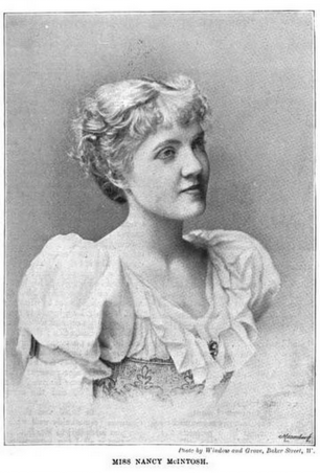
Nancy Isobel McIntosh was an American-born singer and actress who performed mostly on the London stage. Her father was a member of the South Fork Fishing and Hunting Club, which had been blamed in connection with the 1889 Johnstown Flood that resulted in the loss of over 2,200 lives in Johnstown, Pennsylvania.

John Le Hay was the stage name of John Mackway Healy, an English singer and actor known for his portrayal of the comic baritone roles in the Savoy Operas. He also appeared in non-musical plays, adaptations of French comic operas and opérettes, and in Edwardian musical comedy, usually in comic roles, though sometimes in more serious character parts. As a skilled ventriloquist he appeared before royalty, and periodically he presented his own one-man entertainment during his half-century long stage career.

Charles Kenningham was an English opera singer and actor best remembered for his roles in the 1890s with the D'Oyly Carte Opera Company.

Trial by Jury is a comic opera in one act, with music by Arthur Sullivan and libretto by W. S. Gilbert. It was first produced on 25 March 1875, at London's Royalty Theatre, where it initially ran for 131 performances and was considered a hit, receiving critical praise and outrunning its popular companion piece, Jacques Offenbach's La Périchole. The story concerns a "breach of promise of marriage" lawsuit in which the judge and legal system are the objects of lighthearted satire. Gilbert based the libretto of Trial by Jury on an operetta parody that he had written in 1868.

Frederick John D'Auban was an English dancer, choreographer and actor of the Victorian and Edwardian eras. Famous during his lifetime as the ballet-master at the Theatre Royal, Drury Lane, he is best remembered as the choreographer of many of the Gilbert and Sullivan operas.
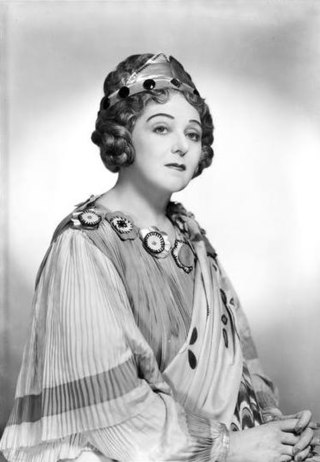
Evelyn Gardiner, born Enid Mary Griffin, was an English opera singer and actress known for her work as principal contralto in the Gilbert and Sullivan comic operas with the D'Oyly Carte Opera Company and J. C. Williamson, as well as for other stage acting. In 1933, Gardiner earned a pilot's licence and claimed to be only the second British actress ever to do so.
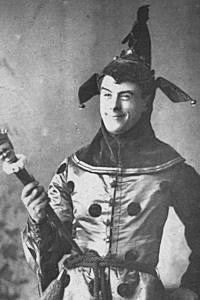
Lewis Cairns James was a Scottish-born baritone, actor, educator and opera producer most prominent during the Victorian and Edwardian eras. From 1887 to 1891 he performed with a D'Oyly Carte Opera Company touring company performing the comic operas of Gilbert and Sullivan before embarking on a successful career on the West End stage and as a teacher of elocution.






















